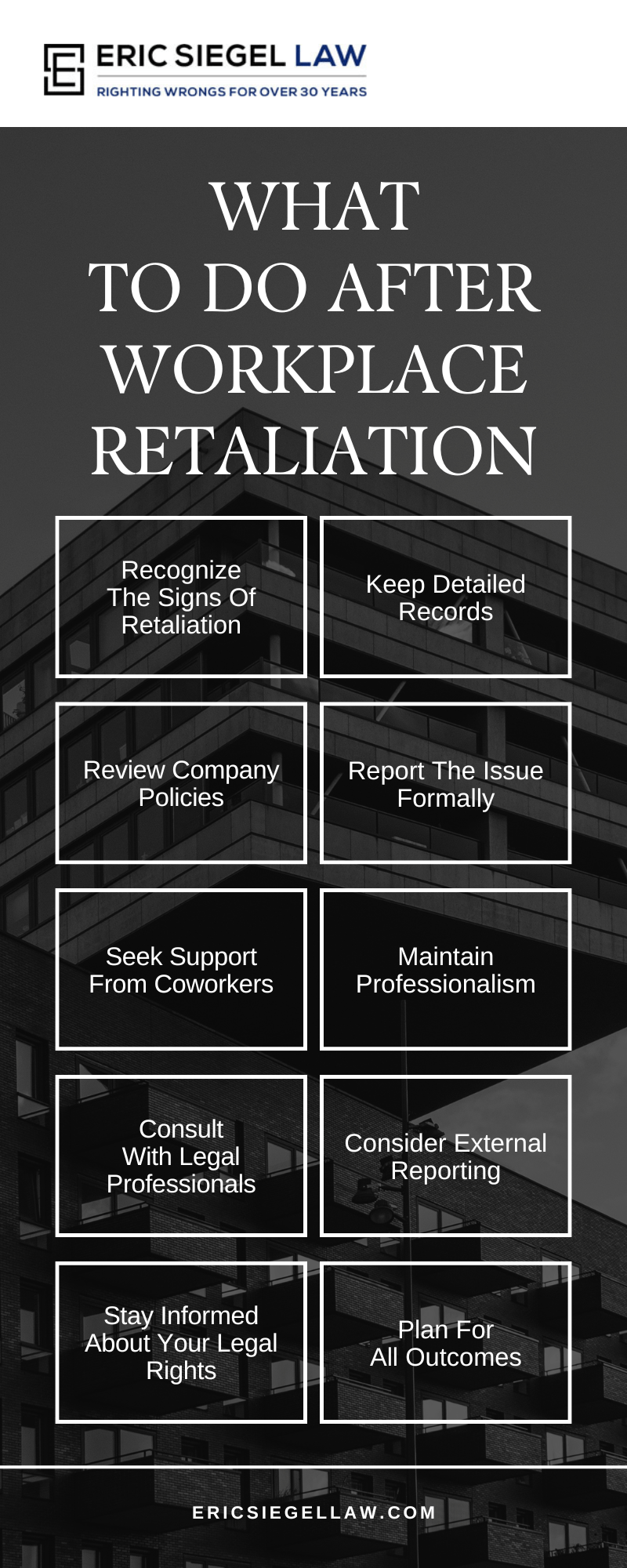
Employment Litigation Lawyer Silver Spring, MD
While our jobs should not define who we are, they can give us a sense of self-worth. So if you are being treated unfairly, discriminated against, or harassed at your workplace, you would understandably be upset. No one deserves to go into work worried about their rights being violated. Coworkers and supervisors cannot act in anger, frustration, or retaliation against a worker. Despite the hostile work environment that many workplaces have, this doesn’t mean that it should be the norm and or accepted. If you have been subjected to unlawful treatment in the workplace, please consider taking action so no further incident can occur. You may be owed compensation as well for the strife you have experienced. Contact Eric Siegel Law today for more information. Our Silver Spring, MD employment litigation lawyer is ready to speak with you.
How Employees Are Protected
As an employee, you have certain rights at the state, federal, and local level. Employee rights may be different depending on the number of employees at the company and if the employer is a local, private, or state government agency, employment agency, federal agency, or labor union. Employees are protected from discrimination and must be provided proper breaks and lunch periods. An example of this would be if a worker works more than four hours, but six or less consecutive hours, no break is necessary. However, if an employee works for four to six consecutive hours, they can have a fifteen minute break. Those who work for more than six consistent hours are entitled to having a half hour break. Employees who work for eight or more consecutive hours can have a half hour break and a fifteen minute break for every four additional consistent hours of work. If your employer tells you something besides this or denies your breaks, they could be in violation of your worker rights.
As our knowledgeable employment litigation attorney explains, employees are also protected against being treated adversely due to their personal characteristics, such as race, nationality, gender, religion, age, disability, and genetic information. Employees must also be given fair opportunities, fair wage for minimum rates and overtime, and safeguarded from harassment based on their protected class. Ultimately, if you have been treated unlawfully in your workplace, now is the time to take action so no further events occur. Let us intervene to protect you.
Eric Siegel Law
If you have experienced unlawful treatment in the workplace, now is the time to speak out against it. Unfortunately, employers are usually concerned about their profits and operations, and may be knowingly or unintentionally violating your protections. Our MD employment litigation attorney has seen how people can be treated unfairly in the workplace. A work environment should be supportive, collaborative, and be inclusive to people of all backgrounds and perspectives. If you suspect that your rights have been violated, we urge you to contact us at Eric Siegel Law so we can set things right. We hope to help you today if you are ready for support. Reach out now for a consultation and advice on how to proceed.
Protecting Your Rights At Work
Losing a job or being denied a promotion because of something unrelated to your performance—such as your race, gender, age, religion, or disability—is a reality no one should face. Yet, employment discrimination remains a serious issue across workplaces. At Eric Siegel Law, we understand how much your livelihood and personal dignity are at stake in these situations. If you’re in need of our Silver Spring MD employment discrimination lawyer, you’re likely searching for someone who brings experience, integrity, and a practical outlook to a stressful and often emotional legal situation.
What Employment Discrimination Can Look Like
Employment discrimination can take many forms, often subtle and hard to prove. Being passed over for jobs, promotions, or key projects, receiving lower pay, or facing unfair treatment and disciplinary actions based on protected characteristics are just a few examples. Discrimination can occur during hiring, while employed, or even when someone is terminated. Sometimes, it’s wrapped in coded language or patterns of behavior that are easy to overlook until the damage has been done.
Whether it’s related to race, gender identity, disability, age, religion, or another protected status, discriminatory practices violate federal and state employment laws. Holding employers accountable requires both legal knowledge and real-world experience.
Our Legal Strategy And Real-World Perspective
We approach every employment discrimination litigation case with the understanding that no two situations are alike. Our process begins with a candid conversation about your experience, timeline, and objectives. From there, we assess the legal options available and build a strategy that aligns with both the law and your real-world needs. With a combination of courtroom experience and business insight, we focus on what will move your case forward in a practical, results-driven way.
Our background brings a unique advantage. Our lead attorney, Eric Siegel, spent over 30 years in litigation and over a decade in business and real estate, working as an investor, landlord, owner, and partner on both public and private projects. This hands-on experience allows Eric to offer more than legal analysis—it provides a grounded approach rooted in how businesses and people operate day to day.
Clients choose to work with our firm because:
- They want a direct relationship with their attorney—no middle layers
- They value clear communication and practical advice
- They benefit from our access to broader resources through our Washington, D.C. law firm affiliation
- They trust our judgment in both agency proceedings and courtroom litigation
Our practice spans civil rights, employment and retaliation claims, whistleblower and False Claims Act litigation, disability rights, and commercial and real estate disputes. We’ve argued cases in federal and state courts nationwide and before various government agencies.
Contact Eric Siegal Law Today
If you believe you’ve been wrongfully treated or targeted at your job, it’s important to act quickly. There are strict time limits for filing complaints, and gathering evidence early makes a major difference. We’re here to listen, advise, and—if appropriate—pursue your case with determination and clarity.
At Eric Siegel Law, we’re ready to help you take the next step. If you’re seeking our employment discrimination lawyer with decades of experience, a straightforward approach, and a deep commitment to your case, contact us today. Let’s talk about how we can work together to protect your rights and hold employers accountable.
Addressing Whistleblower Retaliation
Our Silver Spring, MD employment litigation lawyer can help if you suspect you’ve been retaliated against. We have over 30 years of legal experience both inside and outside the court room. We’re also familiar with what retaliation looks like. Our team is ready to support you. Read on to learn more, and see what we can do about your case.
Whistleblower retaliation is a serious issue that occurs when an employee who reports wrongdoing within an organization faces adverse actions as a result. These actions can range from demotion and denial of promotion to termination and harassment. Understanding and addressing these issues is critical for maintaining integrity and justice in the workplace.
Legal Protections For Whistleblowers
Whistleblowers are protected under various federal and state laws designed to encourage individuals to report illegal activities or violations of company policies without fear of retaliation. These laws exist so individuals can bring attention to wrongdoing without risking their careers or personal well-being.
Despite these protections, some organizations still engage in retaliation, which can be subtle or overt. Recognizing the signs of retaliation and knowing the legal protections available are crucial first steps in combating this unlawful behavior.
Recognizing Retaliation
Retaliation can manifest in several ways. It may be as clear as a sudden termination following a report of misconduct, or as subtle as changes in job assignments, increased scrutiny, or being excluded from meetings or communications. It is important to document all instances that may suggest retaliatory behavior as this documentation can be vital in any legal proceedings.
Why It Matters
Whistleblower retaliation not only affects the individual employee but can also have a profound impact on the organizational culture, deterring other employees from coming forward with important disclosures. This can allow unethical practices to continue unchecked, ultimately harming the organization and its stakeholders.
Maintaining an environment where employees feel safe to report misconduct is essential for internal accountability and public trust. Organizations that uphold these values are more likely to foster a loyal and committed workforce.
How We Support Whistleblowers
Our employment attorneys are committed to supporting individuals who have the courage to speak out against wrongdoing. We understand the challenges faced by whistleblowers and provide legal representation to protect their rights and careers.
Our approach involves a thorough analysis of the situation, gathering of evidence, and crafting a strategic response that aims to protect our clients’ professional interests and personal well-being. Our Silver Spring employment lawyers work diligently to hold accountable those who violate whistleblower protection laws.
Reach Out For Guidance And Support
If you believe you have been retaliated against for acting as a whistleblower, do not hesitate to seek professional legal help. Our team is ready to advise you on your rights and the best course of action to take. Protecting your career and ensuring that justice is served are our top priorities.
Contact us today to discuss your situation confidentially. We’re here to walk you through this challenging time, and we’re here to help you speak the truth without fear of retaliation. Reach out and see what our Silver Spring employment litigation lawyer can do for you.
What To Do After Workplace Retaliation
As a whistleblower, you’re afforded certain rights – and our Silver Spring, MD workplace litigation lawyer can help you protect those rights in the first place. We have over 30 years of civil rights and courtroom experience. We handle a wide range of work-related cases, including protecting whistleblowers like you. Read on to see your first steps if you suspect retaliation in the workplace:
- Recognize The Signs Of Retaliation
First, it’s vital to identify what constitutes retaliation. Common signs include sudden negative performance reviews, demotion, reduction in hours, exclusion from meetings, or other punitive actions that occur after you’ve made a complaint or participated in an investigation.
- Keep Detailed Records
Begin documenting every related incident, noting dates, times, places, and the names of individuals involved. Record details of conversations, save emails, messages, and any other communications that could serve as evidence. This documentation can be influential in proving your case.
- Review Company Policies
Familiarize yourself with your employer’s policies on workplace behavior and retaliation. This can often be found in the employee handbook. Understanding these policies can provide guidance on how to formally report the issue and what internal remedies might be available.
- Report The Issue Formally
Follow your company’s protocol for reporting workplace issues. This typically involves submitting a formal complaint to your human resources department. Keep a copy of any report you file and note the date the report is submitted.
- Seek Support From Coworkers
If coworkers have witnessed the retaliation or have experienced similar treatment, their support and statements can bolster your claim. Having others who can corroborate your experiences adds weight to your case and can also provide emotional support.
- Maintain Professionalism
Despite the challenges, continue to perform your job duties to the best of your ability. Maintaining professionalism helps protect your reputation and position within the company, which is particularly important if the situation escalates to legal proceedings.
- Consult With Legal Professionals
Sometimes, internal remedies are not sufficient to resolve retaliation issues. Consulting with a legal team can help you understand your rights and options. Ourt litigation lawyer can offer guidance based on current laws and the specifics of your situation.
- Consider External Reporting
If internal reports do not lead to resolution, or if you experience further retaliation, it may be necessary to file a complaint with a government agency, like the Equal Employment Opportunity Commission (EEOC). Our legal team can assist you in preparing and filing such complaints.
- Stay Informed About Your Legal Rights
Understanding your legal rights is vital. Laws such as the Whistleblower Protection Act and various anti-discrimination statutes provide protections against retaliation. Familiarity with these laws can help you feel more empowered and decisive about the actions you take.
- Plan For All Outcomes
Prepare yourself for all possible outcomes, from a successful resolution within your company to the possibility of seeking new employment. Having a plan can reduce stress and help you transition more smoothly should the need arise.
Contact Us Today To Get Started
Facing retaliation is a serious matter, but you don’t have to deal with it alone. If you’re experiencing retaliation at work and need guidance on how to proceed, reach out to our attorneys and see how our employment lawyer can help.
Silver Spring Employment Litigation Infographic
Silver Spring Employment Litigation Statistics
According to the Center for American Progress, approximately one in five workers in the U.S. has experienced wrongful termination at some point in their professional life. Both federal and Maryland laws allow injured employees to pursue legal action against an employer if they have been wrongfully terminated. It is estimated that workers prevail in approximately 60 percent of these cases.
Due to the complicated nature of these cases, it is recommended that anyone considering legal action should speak with our Silver Spring employment litigation lawyer to learn what legal options they may have.


 Silver Spring Employment Litigation FAQs
Silver Spring Employment Litigation FAQs
Our Silver Spring, MD employment litigation lawyers can help you find justice and closure in the workplace. We have over 30 years of legal experience – and we’ve been involved in business and real estate for over a decade. Now, it’s our turn to use what we know to help you find justice. Read on to learn more about your case, and contact us today to get started.
What Should I Do If I Believe I Was Wrongfully Terminated?
If you suspect your dismissal was unfair, start by collecting all related documents, such as your employment contract, any relevant emails, messages, performance reviews, and a record of any disciplinary actions taken against you. Documenting these details can help demonstrate whether your termination was justified according to your employment agreement and applicable laws. Once you have this information, it is advisable to consult with our legal professional who can guide you through the options available for challenging the termination if it appears to be unjust.
What Are My Rights If I Am Being Harassed At Work?
You have the right to a workplace free from harassment, whether it’s based on race, gender, age, or any other protected characteristic. Report these incidents according to your company’s policies, typically to HR or another designated official. If internal remedies fail or are not pursued by your employer, legal action may be necessary, and our lawyer can help you prepare and proceed with this approach.
How Can I Address Wage And Hour Violations By My Employer?
If you believe that your employer has failed to properly pay you for hours worked, or has committed other wage and hour violations, keeping detailed records is key. Note your hours worked, any overtime, and compare these to your pay stubs and any applicable wage laws. Often, these disputes can be resolved by addressing the issue directly with your employer, but if this does not yield results, you can file a complaint with the state labor department or pursue a lawsuit to recover your wages.
How Do I Prove Retaliation By My Employer?
Retaliation claims require showing that you engaged in a legally protected activity (like filing a harassment complaint), followed by a negative employment action (like being fired or demoted). Documenting the timeline of events is critical. This includes when you engaged in the protected activity, any correspondence or actions from your employer before and after this activity, and any changes to your employment status. This documentation can help our employment lawyer build a stronger case.
How Does Mediation Work In Resolving Employment Issues?
Mediation involves a neutral third party who helps both the employee and employer discuss their issues and attempt to reach a voluntary, mutually acceptable resolution. It’s a confidential process, which can preserve employment relationships and often provides a quicker resolution than litigation. While the mediator facilitates dialogue and helps clarify issues, they do not make decisions like a judge would. If mediation fails, you can still pursue legal action.
Employment Litigation Glossary
When facing challenges at work, it’s imperative you have a solid understanding of your rights. Our Silver Spring, MD employment litigation lawyer can provide valuable assistance in understanding the legal system and how to protect your interests. Employment law can often involve complicated and challenging issues for both employers and employees. Our attorneys aim to clarify key terms to help our clients better understand their rights and obligations in the workplace. Below, we’ve provided explanations for several key legal terms that frequently arise in employment disputes.
Hostile Work Environment
A hostile work environment arises when an employee faces ongoing harassment or discrimination that is severe enough to impact their ability to work. This could involve repeated actions, comments, or behaviors based on an individual’s race, gender, religion, or other legally protected attributes. The key element is that the conduct must be pervasive enough to create an intimidating or offensive atmosphere for a reasonable person. In these cases, the employee does not need to prove a specific economic loss; rather, the focus is on whether the work environment has become toxic due to the inappropriate behavior. Employers can be held accountable if they knew or should have known about the harassment and failed to take adequate steps to stop it.
Whistleblower Retaliation
Whistleblower retaliation refers to adverse actions taken by an employer against an employee who has reported illegal activities, unsafe working conditions, or unethical practices within the organization. Such retaliation can manifest in various forms, including demotion, termination, reduced hours, or negative performance reviews designed to force the employee out. Federal laws like the Whistleblower Protection Act, along with state-specific regulations, safeguard employees who act in good faith to report misconduct. Retaliation cases often hinge on proving that the employer’s actions were directly tied to the employee’s decision to come forward. Employees facing retaliation may be eligible for remedies such as reinstatement, back pay, or compensatory damages.
Protected Class
The concept of a protected class is central to employment law. It refers to groups of individuals legally shielded from discrimination in the workplace. These groups include individuals based on their race, gender, age, religion, national origin, disability, and genetic information. Employers are prohibited from making decisions about hiring, firing, promotions, or any other employment-related actions based on an employee’s status in a protected class. Any adverse employment action taken against someone due to their protected status could lead to legal consequences. Cases involving discrimination often require the employee to show that they were treated less favorably than others because of their membership in one of these groups.
Wrongful Termination
Wrongful termination occurs when an employer unlawfully dismisses an employee. This can happen when an employee is fired due to discrimination, in retaliation for reporting unethical practices, or in breach of a contractual agreement. It’s important to note that in states like Maryland, where at-will employment is the standard, an employer can generally terminate employment for any reason or no reason at all—unless it involves illegal grounds such as discrimination or retaliation. Employees who suspect wrongful termination may have the right to pursue legal remedies, such as compensation for lost wages or reinstatement to their former position. Documentation and evidence of the employer’s intent are often crucial in these cases.
Wage And Hour Violations
Wage and hour laws are designed to protect employees from unfair pay practices. Common violations include failing to pay minimum wage, denying overtime pay, or not providing required meal and rest breaks. Employers are also prohibited from misclassifying employees as independent contractors to avoid paying benefits or overtime. If an employee believes they have been underpaid, they have the right to file a wage claim with the state’s labor department or pursue legal action to recover any unpaid wages. Maryland has specific wage and hour laws that supplement federal standards, offering additional protections for workers. Employers found in violation may face penalties, including paying back wages and additional fines.
At Eric Siegel Law, we are committed to protecting the rights of employees in Silver Spring, MD. If you’re facing any of the situations described above, contact us today to discuss your case and explore your legal options. We’re here to help you secure the justice and compensation you deserve.
Contact Our Team Today
If you are facing any of these issues or other employment concerns, remember that you are not alone. Understanding your rights as an employee or employer is vital in protecting them. Eric Siegel Law is here to help guide and support you through your employment disputes. Contact us today, and see what our Silver Spring employment litigation lawyer can do for you. We are available to discuss your case and explore your options with our experienced team.
Types Of Employment Litigation Cases We Handle
Workplace disputes can take many forms, and when things escalate, your Silver Spring, Maryland employment litigation lawyer can help. At Eric Siegel Law, we’ve been helping our clients for over 30 years. Now, we’re ready to use our legal experience to help you. Read on to learn more about our employment litigation services, and contact us today to get started.
Discrimination In The Workplace
Discrimination can show up in hiring, promotions, pay, or the decision to let someone go. When someone is treated unfairly due to race, age, sex, religion, disability, or other protected traits, that treatment may cross the line. As discrimination lawyers, we work with clients to review their experiences and move forward with a case if the law has been broken.
Wrongful Termination
Losing a job can be hard enough on its own, but when the firing violates the law, it’s even more serious. Wrongful termination cases may involve retaliation, discrimination, or breach of contract. We help our clients look at the facts and figure out whether the firing was lawful, and if not, what comes next.
Wage And Hour Disputes
Pay issues are one of the more common sources of conflict at work. Some workers are misclassified and denied overtime. Others aren’t paid for all hours worked or don’t receive the minimum wage. As your Silver Spring employment litigation lawyers, we’ll take on cases involving unpaid wages, off-the-clock work, missed meal breaks, and other wage violations that affect people’s financial well-being.
Harassment Claims
Workplace harassment can lead to serious emotional harm and a toxic work environment. Whether it’s based on gender, race, or another factor, it’s important to take action when harassment goes unchecked. We help our clients gather documentation, talk through the history of the behavior, and pursue legal action when appropriate.
Retaliation Claims
Some employees are punished for doing the right thing—speaking up about wrongdoing, filing a complaint, or taking leave they’re legally allowed to take. Retaliation can come in many forms: demotion, reduced hours, or even being fired. We’re experienced workplace retaliation lawyers, so we help our clients bring claims when this kind of conduct follows lawful action on their part.
Breach Of Employment Contract
Not all employment is at-will. When a written agreement outlines the terms of employment and those terms are ignored, legal consequences may follow. We work with clients to review the contract, understand the breach, and pursue claims if terms were violated.
Workplace Leave Violations
Laws like the Family and Medical Leave Act (FMLA) protect a worker’s right to take time off for health and family matters. When employers deny or interfere with that leave, legal options may be available. We represent workers who’ve been disciplined or fired after requesting leave or who were denied protected time off.
Whistleblower Protection
Reporting illegal activity or unsafe practices at work shouldn’t come with a price. When it does, we help whistleblowers who have faced retaliation after coming forward. These cases require careful handling to protect the person’s rights and support the claims they’ve made about wrongdoing on the job.
Contact Us To Get Started
At Eric Siegel Law, we’ve helped workers with wage and hour disputes, discrimination, and more. If you’ve experienced disputes in the workplace, don’t handle them alone. Reach out to us today, and get started with a Silver Spring employment litigation lawyer you can trust.
Common Causes Of Workplace Disputes
Disagreements between employers and employees are more common than many people realize. No matter the cause, your Silver Spring, MD employment litigation lawyer can make a difference. At Eric Siegel Law, we’ve spent over 30 years helping employees address issues. Below are some of the most common causes of workplace disputes we’ve seen.
1. Miscommunication And Unclear Expectations
Poor communication is one of the biggest reasons disputes occur. When employees don’t receive clear direction about their responsibilities, goals, or performance standards, frustration can build on both sides. Employers may assume expectations are understood, while workers feel they’re being judged unfairly. Written policies, consistent feedback, and honest discussions can help prevent this kind of confusion.
2. Discrimination In The Workplace
Workplace discrimination remains a leading cause of legal disputes. Employees are protected by law from unfair treatment based on race, gender, age, disability, religion, or other protected categories. Sometimes discrimination is obvious, but it can also be subtle—such as being passed over for promotions or receiving lower pay for similar work. When these patterns appear, employees often seek legal advice to determine whether their rights have been violated.
3. Harassment And Hostile Work Environments
Harassment claims often involve unwanted comments, inappropriate behavior, or actions that make an employee feel uncomfortable or unsafe. Even if the conduct seems minor at first, repeated incidents can create a hostile work environment. Employers must take all complaints seriously and respond promptly. When they fail to do so, employees may feel they have no choice but to pursue legal action.
4. Wage And Hour Disputes
Problems with pay can quickly lead to conflict. These issues may include unpaid overtime, improper classification as exempt or nonexempt, or unclear timekeeping practices. Workers deserve fair compensation for their labor, and employers are required to follow wage and hour laws closely. Disputes over missed paychecks or inaccurate records can often be resolved early with the right documentation, but when they aren’t addressed, you may need to contact your Silver Spring employment litigation lawyer.
5. Retaliation After Reporting Misconduct
Employees who report harassment, discrimination, or wage violations are protected from retaliation under both state and federal law. Retaliation might look like a sudden demotion, a poor performance review, or even termination shortly after filing a complaint. When workers experience this kind of treatment, it can discourage others from speaking up, which allows further problems to develop.
Addressing Workplace Conflicts Early
Many disputes can be resolved before they reach a breaking point if both sides are willing to communicate openly and follow the law. Employees have the right to work in a fair and respectful environment, and they shouldn’t feel pressured to stay silent when something isn’t right. When workplace issues start affecting your job, health, or peace of mind, getting legal guidance can help you understand what options you have.
At Eric Siegel Law, we’ve worked with employees who faced discrimination, retaliation, and other challenges at work. We help our clients take practical steps toward resolving their disputes and protecting their rights. If you’re dealing with a workplace problem, reach out today to discuss your situation with a Silver Spring employment litigation lawyer you can trust.
Employment Litigation Lawyer FAQs
Workplace disputes can affect more than just your job—they can impact your financial security and peace of mind. Whether you’re facing harassment, discrimination, or wrongful termination, your Silver Spring, MD employment litigation lawyer can help you understand your rights. At Eric Siegel Law, we’ve spent over 30 years helping clients just like you. Read on for some answers to important questions, and contact us today to see how a commercial litigation lawyer from our team can help.
What Are The Three Criteria For A Hostile Work Environment?
A hostile work environment occurs when harassment or discrimination makes it difficult for an employee to perform their job. For a valid claim with your business dispute lawyer, the behavior must be unwelcome, based on a protected characteristic such as race, gender, or religion, and severe or pervasive enough to affect working conditions. This means the situation must go beyond simple disagreements or isolated incidents. Repeated offensive comments, intimidation, or discriminatory conduct from coworkers or supervisors may meet these criteria.
What Types Of Workplace Disputes Can I File A Claim For?
Employees can file claims for a variety of workplace issues. Common examples include wrongful termination, discrimination, unpaid wages, retaliation, and harassment. Some claims may also involve contract disputes, such as an employer failing to honor the terms of an employment agreement. Every case is unique, so it’s important to review the facts with your Silver Spring employment litigation lawyer.
How Can I Prove Discrimination At Work?
Proving discrimination requires showing that you were treated unfairly because of a protected characteristic. Evidence might include written communications, performance reviews, witness statements, or documentation of inconsistent treatment compared to other employees. Patterns of biased behavior—such as being passed over for promotions or unfairly disciplined—can also strengthen your claim. The more detailed and organized your records are, the easier it is to build a clear case.
What Evidence Do I Need For A Wrongful Termination Case?
A wrongful termination claim typically requires proof that you were fired for an illegal reason. This may include discrimination, retaliation for reporting misconduct, or violations of an employment contract. Evidence can include emails, text messages, pay records, or witness accounts that support your version of events. Keeping a written record of what happened before and after your termination can help your company litigation lawyer build a stronger case.
What Counts As Retaliation By An Employer?
Retaliation happens when an employer punishes an employee for engaging in legally protected activity. Examples include reporting harassment, filing a complaint, or participating in an investigation. Retaliation can take many forms, such as demotion, pay cuts, poor performance reviews, or termination. Even subtle actions—like removing job responsibilities or excluding an employee from meetings—can count if they occur after the employee exercised their rights.
Contact Us Today
If you believe you’ve been wrongfully treated at work or need help evaluating a potential claim, contact Eric Siegel Law today. With firsthand experience in business and employment law, we can help you find your next steps. Get in touch with us today, and see how a Silver Spring employment litigation lawyer can make a difference.







 Silver Spring Employment Litigation FAQs
Silver Spring Employment Litigation FAQs



